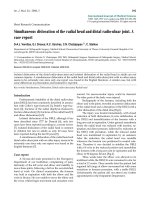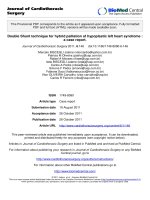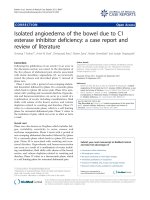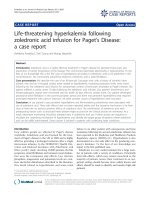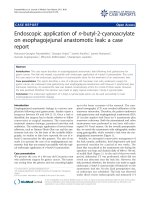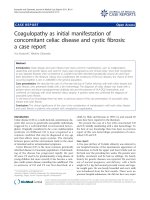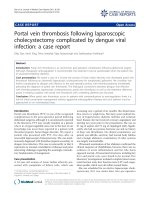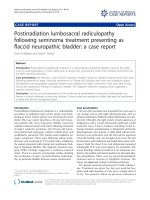Báo cáo y học: "Plasmablastic lymphoma in the ano-rectal junction presenting in an immunocompetent man: a case report" pdf
Bạn đang xem bản rút gọn của tài liệu. Xem và tải ngay bản đầy đủ của tài liệu tại đây (1.12 MB, 5 trang )
CAS E REP O R T Open Access
Plasmablastic lymphoma in the ano-rectal
junction presenting in an immunocompetent
man: a case report
Mayur Brahmania
*
, Thomas Sylwesterowic and Heather Leitch
Abstract
Introduction: Plasmablastic lymphoma is an aggressive non-Hodgkin lymphoma classically occurring in individuals
infected with HIV. Plasmablastic lymphoma has a predilection for the oral cavity and jaw. However, recent case
reports have shown lymphoma in the stomach, lung, nasal cavity, cervical lymph nodes and jejunum in HIV-
negative individuals. We report what is, to the best of our knowledge, the first case of plasmablastic lymphoma
occurring in the ano-rectal junction of an HIV-negative man.
Case Presentation: A previously healthy 59-year-old Caucasian man presented with painless rectal bleeding.
Colonoscopy revealed a lesion in the ano-rectal junction, with pathological examination demonstrating atypical
lymphoid cells consisting primarily of plasmablasts with rounded nuclei, coarse chromatin, small nucleoli and
multiple mitotic figures. Immunohistochemical analysis showed the atypical cells were negative for CD45, CD20,
CD79a and immunoglobulin light chains, but were strongly positive for CD138 and EBV-encoded RNA. The results
were consistent with a diagnosis of plasmablastic lymphoma. Aggressive systemic chemotherapy and involved field
radiation therapy resulted in complete clinical and pathological remission.
Conclusion: Increasing awareness of plasmablastic lymphoma in HIV-negative individuals and in this location is
warranted.
Introduction
Plasmablastic lymphoma (PBL) is most frequently an
AIDS-related non-Hodgkin lymphoma (NHL) and is
usually confined to the oral cavity and jaws, although
involvement of distant sites may occur [1-6]. It is a rapidly
progressive tumor usually seen in human immunodefi-
ciency virus (HIV) infection with advanced immunodefi-
ciency (CD4<200 cells/ml) and, like NHL, is an AIDS
defining illness [7,8]. In recent years, cases of PBL have
been reported involving the lungs [9], stomach [10], cervi-
cal lymph nodes [11], nasal cavity [12] and jejunum [13] in
HIV-negativ e individuals. We report the first case of PBL
to be found in the ano-rectum of an HIV- negative man.
Case presentation
A 59-year-old heterosexual Caucasian man presented
with recurrent and profuse rectal bleeding. Past medical
history was remarkable for an ischiorectal abscess, with
no apparent predisposing conditi ons, which was incised
and drained. Eventually our patient had developed an
anal fistula which was managed with Tisseel
®
(a surgical
adhesive composed from fibrinogen and thrombin).
Later a seton, a length of suture material looped
through a fistula to keep it open and allow pus to drain,
was inserted. The seton was exchanged and tightened
on three occasions and eventually was extruded. Physical
examination at that time showed no remaining fistula.
Our patien t was investigated with a gastrointestinal ser-
ies and colo noscopy which were negative for inflamma-
tory bowel disease and malignancy.
At lymphoma presentation, the history was o therwise
unremarkable; in particular, there was no history of
noticeable lumps, unexplained fevers, drenching sweats,
or weight loss. There were no symptoms related to cyto-
penia. General physical examination w as unremarkable,
with no palpable lymphadenopathy or hepatosplenome-
galy. Digital rectal examination showed scarring of his
* Correspondence:
Department of Medicine, Division of Gastroenterology & Hematology, St
Paul’s Hospital, Vancouver, BC, V5Z 1M9, Canada
Brahmania et al. Journal of Medical Case Reports 2011, 5:168
/>JOURNAL OF MEDICAL
CASE REPORTS
© 2011 Brahmania et al; licensee BioMed Central Ltd. This is an Open Access article distributed under the terms of the Creative
Commons Attribution License ( which permits unrestricted use, distribution, and
reproduction in any medium, provided the origina l work is properly cited.
right peri-anal area and a small, tender, ulcerated mass
was palpable in his anal canal at the nine o’clock lithot-
omy position. There was no blood on the e xamining
glove. Laboratory investigations showed his complete
blood count (CBC), electrolytes, liver panel, calcium,
and lactate dehydrogenase levels to be within normal
range. A serum protein electrophoresis showed no
monoclonal protein; however there was a slight decrease
in the gamma fraction at 8 g/L (lower limit of normal
10 g/L). A scre en for hepatitis B and C was negative, as
was serology for varicella zoster virus, Epstein-Barr virus
(EBV), cytomegalovirus, herpes simplex virus and HIV.
Our patient underwent a colonoscopy which showed a
normal colon apart from a 5 mm polyp at 20 cm which
was hyperplastic by pathologic examination. At the ano-
rectal junction, a hypervascular cauliflower-like mass o f
3 mm was seen and biopsied (Figure 1). Histopathologi-
cal examination demonstrated abundant atypical large
lymphoid cells with lesser numbers of plasma cells. The
atypical lymphoid cell population consisted predomi-
nantly of plasmablasts with rounded nuclei, coarse chro-
matin, small nucleoli and multiple mitotic figures.
Immunohistochemical analysis showed the atypical cells
were negative for C D3, CD5, CD10, CD20, CD30,
CD45, CD56, BCL-2, BCL-6, CD45 (Figure 2a), CD20
(Figure 2b), CD79a. Furthermore, we could not detect
any restriction of immunoglobulin light chains (kappa
or lambda), or expression of immunoglobulin heavy
chains IgG, IgM, IgD; however there was cytoplasmic
expression of IgA. In contrast, the neoplastic cells were
strongly positive for MUM1, epithelial membrane anti-
gen, CD38, CD138 (Figure 2c) and EBV-encoded RNA
(EBER) (Figur e 2d). There was no expression of LANA-
1. The proliferation index by Ki-67 immunohistochemis-
try was approximately 70%. The results were consistent
with a diagnosis of PBL.
Staging investigations included a computed tomogra-
phy (CT) scan of the chest, abdomen and pelvis, which
showed no evidence of lymphoma in these other sites. A
bone marrow aspirate and biopsy was negative for lym-
phoma. Our patient was staged as Ann Arbor 1A (Addi-
tional file 1: Table S1), and was low risk according to
the International Prognostic Index. Our patient subse-
quently underwent gallium scanning, which showed
increased activity in his right inguinal region (2 cm),
suggestive of gallium avid lymphoma.
Our patient was treated with three cycles of CHOP
chemotherapy (cyclophosphamide, doxorubicin, vincris-
tine and prednisolone), in full doses and on schedule,
followed by involved field radiation therapy to the ano-
rectal region, pelvic nodes, and right inguinal nodes.
The chemotherapeutic regimen and radiation therapy
were well tolerated by our patient and no complications
were reported. A CT scan done following therapy
showed complete resolution of previously detected
abnormalities. CT scanning at six months from lym-
phoma diagnosis showed no evidence of recurrence.
Mos t recent clinical follow up was done five years from
diagnosis with rectal examination and colonoscopy
showing ongoing remission.
Discussion
PBL is usually diagnosed in the context of HIV infec-
tion, however in recent years it has also been reported
in a number of sit es in HIV-negative individuals [9-13].
As seen from our case report, it can also be found in
the hindgut. Derived from B-cells, PBL has distinct mor-
phologic and immunophenotypic features by which it
has been defined [14,15]. PBL has some morphologic
characteristics similar to diffuse large B-cell lymphoma
(DLBCL) and the World Health Organization classifies
PBL as a variant of DLBCL. However, PBL is differen-
tiated from DLBCL by minimal or no expression of
CD20 and leukocyte common antigen. Instead, PBL has
been characterized by the plasmablastic morphology of
the neoplastic cells, with numerous mitotic figures, the
expression of plasma cell markers such as VS38c and
CD138/syndecan-1 [1,3,15] and EBER positivity [16].
PBL has been shown to have an immunophenotype
and tumor suppressor gene expression profile virtually
identical to that of the plasmablastic variant of plasma
cell myeloma. In cont rast, this profile is unlike that of
DLBCL, suggesting a cell of origin more in keeping with
myeloma than NHL. However, unlike myeloma, and
unlike the majority of DLBCL in imm unocompetent
individuals, it was found that most HIV-positive patients
with PBL were EBER-positive [16].
Evidence supporting a pathogenic role for human
herpes-virus-8/Kaposi’s sarcoma-associated herpes virus
(HHV-8/KSHV) in promoting lymphoma cell growth
→
Figure 1 Mass at the ano-rectal junction.
Brahmania et al. Journal of Medical Case Reports 2011, 5:168
/>Page 2 of 5
has been described almost exclusively in HIV-related
cases of PBL and/or multicentric Castleman’sdisease
[17-20]. In these disorders, an interaction between HIV
and HHV-8 has been suggested, whereby viral interleu-
kin-6 may provide a mitogenic stimulus resulting in
enhanced proliferation of HIV in patients co-infected
with both viruses, in addition to supporting the survival
of infected lymphocytes, thus predisposing them to
transforming events [21-25]. Our HIV-negative patient
had no evidence of infection by HHV-8.
It is unclear if PBL is associated with a relative state of
immunosuppression in HIV-negative patients. Although
our patient was HIV negative, it is possible the recurrent
problems with abscess formation and fistulas may have
led to a state of relative immunosuppression and devel-
opment of lymphoma, or the ongoing inflammation may
have promoted survival of lymphocytes which then
underwent further transforming events. Alternatively,
the recurrent abscesses may have been secondary to a
previously unrecognized state of relative immunosup-
pression, as indicated by the decrease in gamma globu-
lins demonstrated on serum protein electrophoresis. In
a case series reported by Teruya-Feldstein et al. [26],
two out of six cases of PBL in HIV-negative individuals
occurred in the setting of iatrogenic immunosuppres-
sion; one was a recipient of a renal allograft with locali-
zation of PBL to the skin of the leg [27] and the other a
patient with ulcerative colitis receiving azathioprine [28].
Both cases were EBV positive. It has been documented
that EBV-positive Hodgkin lymphoma may be associated
with Crohn’s disease [29,30], providing further sugges-
tion that immune dysregulation may play a role in the
development of PBL. While a minority of HIV-negative
patients have EBV-positive NHL, EBV positivity is more
frequently associated with immunosuppression-related
lymphoma, and the EBV positivity of the PBL in our
patient further supports that he may have had a state of
relative immunosuppression.
A
B
C
D
Figure 2 Immunohistochemical staining (a) CD45 (b) CD20 (c) CD138 (d) EBER.
Brahmania et al. Journal of Medical Case Reports 2011, 5:168
/>Page 3 of 5
Current guidelines for the treatment of lymphoma in
early stage include CHOP or similar chemotherapy regi-
mens, with or without involved field radiation therapy.
In the case studies of HIV-negative individuals with
PBL, all including our patient received CHOP. Future
therapies may take into account the infection of lym-
phoma cells with EBV and possibly HHV-8, and the
similarities of these cells to plasma cells, and may direct
therapy toward these specific features.
Conclusion
We report a c ase of a patient with PBL, an aggressive
NHL usually associated with significant and documented
immunosuppression, which can occur in immunocom-
petent individuals, most usually i n the gastrointestinal
tract. Biopsy, with accurate pathological and immuno-
histological testing is essential for the correct diagnosis
and planning subsequent therapy.
Consent
This report was prepared in accordance with require-
ments of the Institutional Research Ethics Board. Writ-
ten informed consent was obtained from the patient for
publication of this case report and any accompanying
images. A copy of the written consent is available for
review by the Editor-in-Chief of this journal.
Additional material
Additional file 1: S1: Ann Arbor staging classification for Hodgkin
and Non-Hodgkin lymphomas. The table shows the different stages of
both Hodgkin’s and Non-Hodgkin’s lyphomas.
Authors’ contributions
MB conceptualized, designed and was a major contributor in writing the
manuscript. TS performed the colonoscopy. HL was a major contributor in
writing the manuscript. All authors read and approved the final manuscript.
Competing interests
The authors declare that they have no competing interests.
Received: 30 April 2010 Accepted: 3 May 2011 Published: 3 May 2011
References
1. Delecluse HJ, Anagnostopoulos I, Dallenbach F, Hummel M, Marafioti T,
Schneider U, Huhn D, Schmidt-Westhausen A, Reichart PA, Gross U, Stein H:
Plasmablastic lymphomas of the oral cavity: a new entity associated
with the human immunodeficiency virus infection. Blood 1997,
89:1413-1420.
2. Flaitz CM, Nichols CM, Walling DM, Hicks MJ: Plasmablastic lymphoma: An
HIV-associated entity with primary oral manifestations. Oral Oncol 2002,
38(1):96-102.
3. Carbone A, Gaidano G, Gloghini A, Ferlito A, Rinaldo A, Stein H: AIDS-
related plasmablastic lymphomas of the oral cavity and jaws: a
diagnostic dilemma. Ann Otol Rhinol Laryngol 1999, 108(1):95-99.
4. Jambusaria A, Shafer D, Wu H, Al-Saleem T, Perlis C: Cutaneous
plasmablastic lymphoma. J Am Acad Dermatol 2008, 58(4):676-678.
5. Lim JH, Lee MH, Lee MJ, Kim CS, Lee JS, Choi SJ, Yi HG: Plasmablastic
lymphoma in the anal canal. Cancer Res Treat 2009, 41(3):182-185.
6. Valenzuela AA, Walker NJ, Sullivan TJ: Plasmablastic lymphoma in the
orbit: case report. Orbit 2008, 27:227-229.
7. Nasta SD, Carrum GM, Shahab I, Hanania NA, Udden MM: Regression of a
plasmablastic lymphoma in a patient with HIV on highly active
antiretroviral therapy. Leuk Lymphoma 2002, 43(2):423-426.
8. Nguyen DD, Loo BW, Tillman G, Natkunam Y, Cao TM, Vaughan W,
Dorfman RF, Goffinet DR, Jacobs CD, Advani RH: Plasmablastic lymphoma
presenting in a human immunodeficiency virus-negative patient: a case
report. Ann Hematol 2003, 82(8):521-525.
9. Lin Y, Rodrigues GD, Turner JF, Vasef MA: Plasmablastic lymphoma of the
lung: report of a unique case and review of the literature. Arch Pathol
Lab Med 2001, 125(2):282-285.
10. Pruneri G, Graziadei G, Ermellino L, Baldini L, Neri A, Buffa R: Plasmablastic
lymphoma of the stomach. A case report. Haematologica 1998,
83(1):87-89.
11. Lin F, Zhang Z, Quiery A, Prichard J, Schuerch C: Plasmablastic lymphoma
of the cervical lymph nodes in a human immunodeficiency virus-
negative patient: a case report and review of the literature. Arch Pathol
Lab Med 2004, 128(5):581-584.
12. Gaidano G, Cerri M, Capello D, Berra E, Deambrogi C, Rossi D, Larocca LM,
Campo E, Gloghini A, Tirelli U, Carbone A: Molecular histogenesis of
plasmablastic lymphoma of the oral cavity. Br J Haematol 2002,
119(3):622-628.
13. Cha JM, Lee JI, Joo KR, Jung SW, Shin HP, Lee JJ, Kim GY: A case report
with plasmablastic lymphoma of the jejunum. J Korean Med Sci 2010,
25(3):496-500.
14. Vega F, Chang CC, Medeiros LJ, Udden MM, Cho-Vega JH, Lau CC, Finch CJ,
Vilchez RA, McGregor D, Jorgensen JL: Plasmablastic lymphomas and
plasmablastic plasma cell myelomas have nearly identical
immunophenotypic
profiles. Mod Pathol 2005, 18(6):806-815.
15. Montes-Moreno S, Gonzalez-Medina AR, Rodriguez Pinilla SM, Maestre L,
Sanchez-Verde L, Roncador G, Mollejo M, Garcia JF, Menarguez J,
Montalban C, Ruiz-Marcellan C, Conde E, Piris M: Aggressive large B cell
lymphoma with plasma cell differentiation: immunohistochemical
characterization of plasmablastic lymphoma and diffuse large B cell
lymphoma with partial plasmablastic phenotype. Haematologica 2010,
95(8):1342-1349.
16. Carbone A, Gloghini A, Larocca LM, Capello D, Pierconti F, Canzonieri V,
Tirelli U, Dalla-Favera R, Gaidano G: Expression profile of MUM1/IRF4, BCL-
6, and CD138/syndecan-1 defines novel histogenetic subsets of human
immunodeficiency virus-related lymphomas. Blood 2001, 97(3):744-571.
17. Dong HY, Scadden DT, de Leval L, Tang Z, Isaacson PG, Harris NL:
Plasmablastic lymphoma in HIV-positive patients: an aggressive Epstein-
Barr virus-associated extramedullary plasmacytic neoplasm. Am J Surg
Pathol 2005, 29(12):1633-1641.
18. Colomo L, Loong F, Rives S, Pittaluga S, Martínez A, López-Guillermo A,
Ojanguren J, Romagosa V, Jaffe ES, Campo E: Diffuse large B-cell
lymphomas with plasmablastic differentiation represents a
heterogeneous group of disease entities. Am J Surg Pathol 2004,
28(6):736-747.
19. Boulanger E, Agbalika F, Maarek O, Daniel MT, Grollet L, Molina JM,
Sigaux F, Oksenhendler E: A clinical, molecular and cytogenetic study of
12 cases of human herpesvirus 8 associated primary effusion lymphoma
in HIV-infected patients. Hematol J 2001, 2(3):172-179.
20. Du MQ, Diss TC, Liu H, Ye H, Hamoudi RA, Cabeçadas J, Dong HY,
Harris NL, Chan JK, Rees JW, Dogan A, Isaacson PG: KSHV- and
EBVassociated germinotropic lymphoproliferative disorder. Blood 2002,
100(9):3415-3418.
21. Dupin N, Diss TL, Kellam P, Tulliez M, Du MQ, Sicard D, Weiss RA,
Isaacson PG, Boshoff C: HHV-8 is associated with a plasmablastic variant
of Castleman disease that is linked to HHV-8-positive plasmablastic
lymphoma. Blood 2000, 95(4) :1406-1412.
22. Song J, Ohkura T, Sugimoto M, Mori Y, Inagi R, Yamanishi K, Yoshizaki K,
Nishimoto N: Human interleukin-6 induces human herpesvirus-8
replication in a body cavity-based lymphoma cell line. J Med Virol 2002,
68(3):404-411.
23. Gage JR, Breen EC, Echeverri A, Magpantay L, Kishimoto T, Miles S,
Martínez-Maza O: Human herpesvirus 8-encoded interleukin 6 activates
HIV-1 in the U1 monocytic cell line. AIDS 1999, 13(14):1851-1855.
24. Li H, Wang H, Nicholas J: Detection of direct binding of human
herpesvirus 8-encoded interleukin-6 (vIL-6) to both gp130 and IL-6
Brahmania et al. Journal of Medical Case Reports 2011, 5:168
/>Page 4 of 5
receptor (IL-6R) and identification of amino acid residues of vIL-6
important for IL-6R-dependent and independent signaling. J Virol 2001,
75(7):3325-3334.
25. Chatterjee M, Osborne J, Bestetti G, Chang Y, Moore PS: Viral IL-6-induced
cell proliferation and immune evasion of interferon activity. Science 2002,
298(5597):1432-1435.
26. Teruya-Feldstein J, Chiao E, Filippa DA, Lin O, Comenzo R, Coleman M,
Portlock C, Noy A: CD20-negative large-cell lymphoma with plasmablastic
features: a clinically heterogenous spectrum in both HIV-positive and
-negative patients. Ann Oncol 2004, 15(11):1673-1679.
27. Nicol I, Boye T, Carsuzaa F, Feier L, Collet Villette AM, Xerri L, Grob JJ,
Richard MA: Post-transplant plasmablastic lymphoma of the skin. Br J
Dermatol 2003, 149(4):889-891.
28. Kumar S, Fend F, Quintanilla-Martinez L, Kingma DW, Sorbara L, Raffeld M,
Banks PM, Jaffe ES: Epstein-Barr virus-positive primary gastrointestinal
Hodgkin’s disease: association with inflammatory bowel disease and
immunosuppression. Am J Surg Pathol 2000, 24(1):66-73.
29. Li S, Borowitz MJ: Primary Epstein-Barr virus-associated Hodgkin disease
of the ileum complicating Crohn disease. Arch Pathol Lab Med 2001,
125(3):424-427.
30. Wong NA, Herbst H, Herrmann K, Kirchner T, Krajewski AS, Moorghen M,
Niedobitek F, Rooney N, Shepherd NA, Niedobitek G: Epstein-Barr virus
infection in colorectal neoplasms associated with inflammatory bowel
disease: detection of the virus in lymphomas but not in
adenocarcinomas. J Pathol 2003, 201(2):312-318.
doi:10.1186/1752-1947-5-168
Cite this article as: Brahmania et al.: Plasmablastic lympho ma in the
ano-rectal junction presenting in an immunocompetent man: a case
report. Journal of Medical Case Reports 2011 5:168.
Submit your next manuscript to BioMed Central
and take full advantage of:
• Convenient online submission
• Thorough peer review
• No space constraints or color figure charges
• Immediate publication on acceptance
• Inclusion in PubMed, CAS, Scopus and Google Scholar
• Research which is freely available for redistribution
Submit your manuscript at
www.biomedcentral.com/submit
Brahmania et al. Journal of Medical Case Reports 2011, 5:168
/>Page 5 of 5
